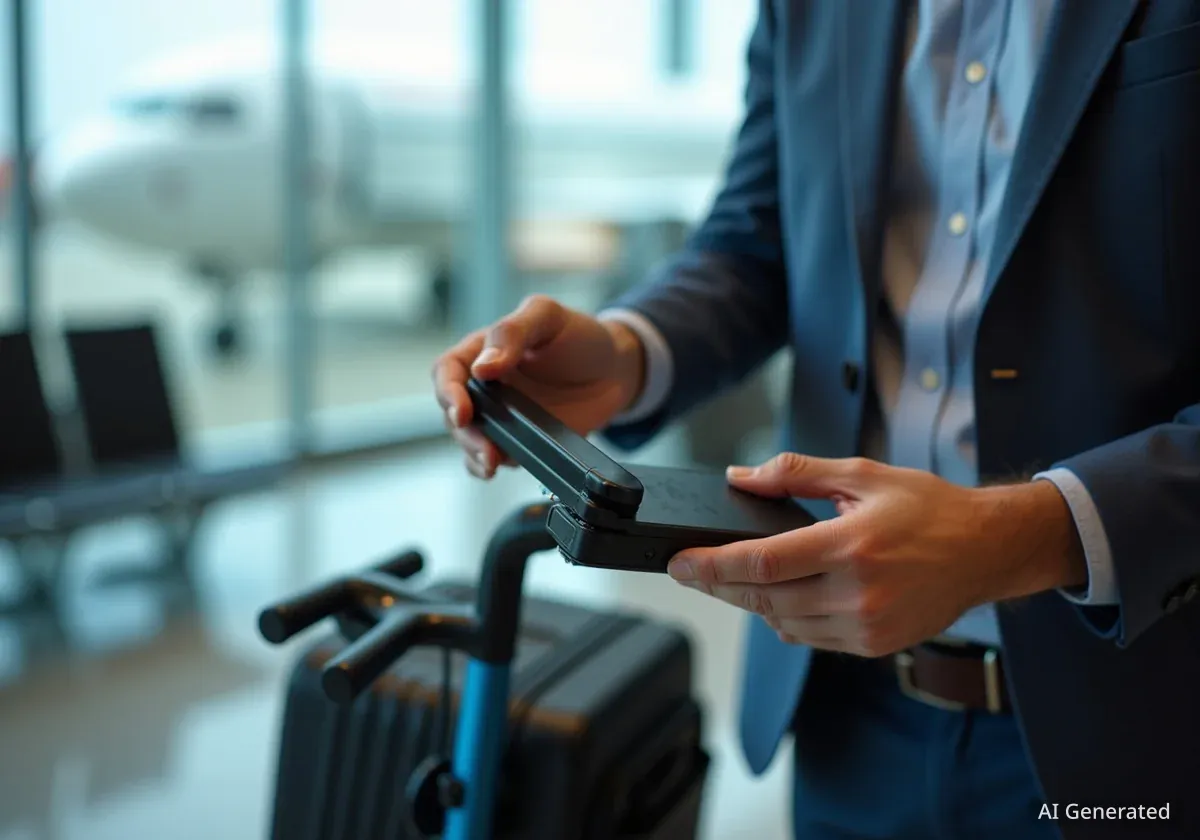Southwest Airlines is implementing a new policy for passengers traveling with lithium battery-powered mobility devices. Effective September 25, 2024, travelers must remove these batteries from their wheelchairs or scooters before checking the device and carry the batteries into the aircraft cabin. This change aims to enhance safety due to fire risks associated with lithium batteries.
The airline also announced new size limits for these batteries, setting a maximum of 300 watt-hours per battery. A grace period for larger batteries will extend until January 11, 2026, after which no batteries exceeding this limit will be accepted for transport.
Key Takeaways
- Passengers must remove lithium batteries from mobility devices before checking.
- Batteries must be carried into the aircraft cabin.
- New size limit of 300 watt-hours per battery is now in effect.
- A grace period for larger batteries ends January 11, 2026.
- The policy aims to reduce fire risks from lithium batteries on flights.
New Requirements for Mobility Device Batteries
Beginning September 25, 2024, Southwest Airlines passengers using mobility devices such as electric wheelchairs and scooters that rely on lithium batteries will be subject to new rules. These travelers must detach the lithium batteries from their devices before the device is checked at the gate or counter.
Once removed, these batteries must be transported by the passenger into the aircraft cabin. Southwest Airlines has clarified that these batteries will not count towards a passenger's standard carry-on or personal item limits, ensuring that travelers do not face additional baggage restrictions due to this safety measure.
Important Dates
- September 25, 2024: New policy on battery removal and cabin carry-on begins.
- January 11, 2026: Grace period for batteries exceeding 300 watt-hours ends.
Battery Size Limits and Grace Period
In addition to the removal requirement, Southwest Airlines is imposing a new size restriction for lithium batteries. Each battery must have a capacity of 300 watt-hours or less. This aligns with existing Federal Aviation Administration (FAA) guidelines for electric wheelchair and scooter batteries.
The airline is providing a grace period for customers who currently possess batteries larger than 300 watt-hours. This period will last until January 11, 2026. After this date, no batteries exceeding the 300 watt-hour limit will be permitted on Southwest flights, even if they were previously allowed under the grace period.
According to FAA regulations, passengers using mobility devices can also carry one spare battery of 300 watt-hours or less. Alternatively, they may carry two spare batteries, each with a capacity of 160 watt-hours or less. These spare batteries must also be carried into the cabin.
Safety Concerns Drive Policy Changes
The primary reason for these policy updates is the increased risk of smoke and fire incidents involving lithium batteries. Dave Hunt, Southwest's Vice President of Safety and Security, communicated this in a letter to airline employees regarding the new policy.
"Lithium batteries have become one of the most common sources of smoke and fire incidents on aircraft," Hunt stated. "While these events are rare, quick access and visibility are critical to keeping everyone onboard safe. By taking proactive steps now, Southwest will be among the first U.S. carriers to adopt these higher standards."
Lithium-ion batteries are known for their high energy density, which makes them efficient but also susceptible to thermal runaway if damaged, short-circuited, or overcharged. When thermal runaway occurs, a battery can rapidly overheat, leading to smoke, fire, or even explosion. Having these batteries in the cabin allows flight crews to respond more quickly if an incident occurs.
Industry-Wide Safety Measures
In recent months, the Transportation Security Administration (TSA) and the FAA, along with various airlines, have been adjusting rules regarding items containing lithium batteries. These changes reflect a growing industry focus on mitigating potential fire hazards.
For example, new rules have been introduced for flying with power banks, portable chargers, and cordless curling irons. The TSA now prohibits portable chargers and power banks in checked luggage due to fire risks from overheating devices. These devices must be carried in the cabin, similar to the new rule for mobility device batteries.
Impact on Travelers and Airline Communication
Southwest Airlines recognizes the importance of mobility devices for many passengers. Hunt emphasized that the policy change prioritizes safety while aiming to avoid unnecessary travel barriers. The airline spokesperson confirmed to The Arizona Republic that Southwest is actively notifying affected customers about these policy adjustments.
The airline estimates that the new policy will affect a small percentage of its total passenger base, specifically less than 0.1% of Southwest travelers. This suggests that while the impact is significant for those who rely on lithium battery-powered mobility devices, the overall number of affected individuals is relatively low.
Passengers planning to travel with lithium battery-powered mobility devices are advised to contact Southwest Airlines directly or visit their official website for detailed information and any specific requirements that may apply to their travel plans. Early preparation can help ensure a smooth travel experience.
Broader Implications for Air Travel
This move by Southwest Airlines indicates a broader trend in the aviation industry towards stricter regulations for lithium batteries. As technology advances and more devices rely on these powerful batteries, airlines and regulatory bodies are continuously evaluating and updating safety protocols. The goal is to balance passenger convenience with the highest possible safety standards.
These changes reflect a proactive approach to safety, learning from past incidents and implementing measures to prevent future ones. Passengers are encouraged to stay informed about airline policies, especially concerning electronic devices and batteries, as rules can evolve.
- Always check airline policies before flying with lithium batteries.
- Ensure batteries are properly packed and stored according to regulations.
- Consider the watt-hour rating of your batteries to avoid travel disruptions.





